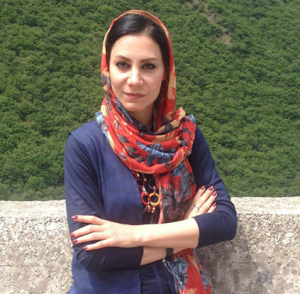 Christian convert Laleh Saati was arrested in February 2024 and one month later was sentenced to two years in prison for her Christian activities. In 2017 she had returned to Iran from Malaysia, where she was baptised, and following her return intelligence agents summoned and interrogated her on numerous occasions. Laleh has been struggling with her mental health in prison and has been threatened with new court proceedings and denied parole as a result of the publicity her case has received and her refusal to record a forced confession. Without parole, she would be due for release in early 2026.
Christian convert Laleh Saati was arrested in February 2024 and one month later was sentenced to two years in prison for her Christian activities. In 2017 she had returned to Iran from Malaysia, where she was baptised, and following her return intelligence agents summoned and interrogated her on numerous occasions. Laleh has been struggling with her mental health in prison and has been threatened with new court proceedings and denied parole as a result of the publicity her case has received and her refusal to record a forced confession. Without parole, she would be due for release in early 2026.
Christian convert Laleh Saati (46) returned to her native Iran from Malaysia in 2017, frustrated at the time it was taking to process her asylum claim and wanting to be reunited with her elderly parents. She had been baptised in a church in Malaysia and following her return intelligence agents summoned and interrogated her on numerous occasions.
On 13 February 2024 Laleh was arrested at her father’s home in Ekbatan Town, a suburb of Tehran, and taken to Ward 209 of Evin Prison, which is under the jurisdiction of the Ministry of Intelligence. She was reportedly interrogated for around three weeks, during which photographs and videos of her Christian activities and baptism in Malaysia were brought before her as evidence of her “crime”. She was then transferred to the women’s ward of the prison.
Laleh was charged with “acting against national security by connecting with ‘Zionist’ Christian organisations” and on 16 March 2024 she was brought before the notorious judge Iman Afshari at Branch 26 of the Tehran Revolutionary Court, who has built a reputation for harsh sentencing of Christians. He reportedly asked her why she had risked returning to Iran and having a court case opened against her, “given that you have done such things outside of Iran”. Eight days later, the court sentenced her to two years in prison plus a two-year travel ban following release. She was informed of her sentence in prison.
Director of Article 18 Mansour Borji expressed surprise at the speed with which Laleh’s case had progressed through the courts and commented, “Laleh’s case clearly shows that the Christian activities of asylum-seekers in foreign countries can be used against them in court proceedings back in Iran. I hope immigration authorities around the world will take note of this, and think twice before rejecting out of hand the asylum claims of genuine Christians who may face persecution upon return to their country of origin.”
In May 2024 Laleh’s mother visited her in prison and reported that her daughter was struggling with her mental health due to the pressure she had been under since being imprisoned, and that she needed psychological help. Laleh’s mother reportedly asked judge Iman Afshari whether he might reduce her daughter’s sentence but was told that she must wait for the result of her appeal.
During the summer of 2024 Laleh was threatened with new court proceedings as a result of the publicity her case had received. Human Rights in Iran reported in July that she had been taken back from the women’s ward in prison to Ward 209 for a 24-hour interrogation. Her mother was also reportedly interrogated and was warned that Laleh might face a second conviction because the case had been publicised to foreign media and that a case might be opened against her for the same reason.
In October 2024 Human Rights in Iran reported that Laleh had been denied parole (to which she should have been eligible, having served one third of her sentence) because she refused to record a forced confession and public disavowal of reports about her case.
Family
Laleh’s elderly parents live in Tehran’s suburbs and part of her reason for returning home from Malaysia in 2017 was to be with them as they grew older. Since Laleh’s imprisonment her mother has been interrogated and warned that a case might be opened against her because her daughter’s case had been publicised to foreign media.
TIMELINE
2017 Laleh Saati returned to Iran from Malaysia, where she had been seeking asylum and had been baptised.
13 February 2024 Laleh was arrested at her father’s home in Ekbatan Town, a suburb of Tehran, and taken to Evin Prison.
16 March 2024 Laleh was brought for trial before judge Iman Afshari at Branch 26 of the Tehran Revolutionary Court.
24 March 2024 The court sentenced Laleh to two years in prison plus a two-year travel ban following release.
May 2024 Laleh’s mother visited her in prison and reported that she was struggling with her mental health.
Summer 2024 Laleh was threatened with new court proceedings and was interrogated again. Her mother was also interrogated.
October 2024 Laleh should have been eligible for parole, having served one third of her sentence, but parole was denied, reportedly because of her refusal to record a forced confession.
Read more about the persecution of Christians in Iran.
(Article 18, Human Rights in Iran, Human Rights Activists News Agency, United for Iran)
Photo credit: Facebook via Article 18
